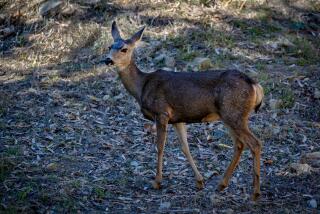Kenya focus of wildlife debate
NAIVASHA, KENYA — For the farmers of Kenya, life is a constant contest for grass and water between their herds and the wild animals that share the land.
Now they are waging a new struggle, this time against the international animal welfare lobby. Pleading poverty, the farmers want to open their land to wealthy fee-paying hunters. The advocacy groups are firmly opposed.
The standoff has made Kenya the latest and perhaps most dramatic arena for the international debate over hunting and its role in financing conservation.
A million tourists a year spend more than $580 million to see and photograph lions, elephants, gazelle and other wildlife on this East African country’s savannas.
But the revenue isn’t enough to protect the animals.
Only 8% of land in Kenya, a country twice the size of Nevada, is set aside for wildlife. The rest is privately or communally owned, and studies show that is where most of Kenya’s wild animals live.
By some estimates, wildlife populations have dropped 60% since the mid-1970s and continue to plummet because of human encroachment and illegal hunting for food.
Landowners say they can continue to maintain animal sanctuaries only if they can sell hunting rights. They are not proposing that hunters be allowed to kill endangered species or given access to protected areas. Only common animals on private land would be hunted, and the killing would be controlled in a way that would sustain their numbers, advocates say.
“The losses we are getting from livestock predation, or even medical bills for people who have been injured by elephants, buffaloes and even lions, is quite high,” said Yusuf Ole Petenya, secretary of the Shompole Community Trust, a tribal foundation in animal-rich southern Kenya.
The trust opened a luxury wildlife lodge to help lift Petenya’s Masai clan out of poverty, but “it’s not working,” he said, because the cost of conservation outstrips the profit from tourism.
Kenya has substandard healthcare, low education levels and a government that barely functions outside Nairobi, the capital. There is no money to buy land or pay people to protect wildlife.
Kenya banned sport hunting in 1977, but allowed limited hunting to cull animals and harvest game meat until 2003, when animal rights groups managed to shut it down.
Now the Kenyan government has reopened the debate over hunting by setting up an advisory group to thrash out the pros and cons. In favor are hunting groups such as Safari Club International; opposed are the International Fund for Animal Welfare, Born Free, Action Aid and others.
James Isiche, the East Africa director for the animal welfare fund, said his organization seeks a blanket ban on what it calls “consumptive use of wildlife.”
“I don’t think bringing back hunting will enhance wildlife management,” said Isiche, a Kenyan. “If you look at wildlife from the point of view that wildlife can bring in money, you begin to get into trouble.”
Isiche, who sits on the government advisory committee on hunting, agrees that wildlife is suffering from a loss of habitat. He says the answer is for donors to buy more land for conservation, strictly limit development in rural areas and compensate people for losses caused by wildlife. But he acknowledges that funding is scarce.
Opposing him is Andrew Enniskillen, also Kenyan and a leader among private landowners. He has combined land rehabilitation, wildlife conservation and commercial cattle breeding on his ranch on Lake Naivasha. He says the wildlife corridor he provides to a nearby national park is costing him financially and the resulting boom in the zebra population is destroying his ranch.
A zebra drinks four times as much water as a cow.
If he can’t manage and profit from the wildlife on his property, “then my operation cannot be sustained,” he said.
He argues that revenue from hunting would provide more funds for conservation and help fight the poaching problem. When hunting was allowed, he says, he could control the zebra population by hiring a hunter to kill as many as 100 a year and sell the skins and meat.
Ranches such as Enniskillen’s once used income from hunting to employ anti-poaching patrols, but can no longer afford them. Some organizations estimate that as much as 30% of the meat consumed in Kenya is from wild animals, such as gazelle, zebra and buffalo.
Hunting “has to be scientific -- what we take off must be ethically done and minimize the suffering of the animal,” he said.
He could make more money by using his land for housing, but if all landowners did that, wildlife “would be virtually exterminated outside the protected areas in five years,” Enniskillen said. “National parks will become zoos.”
The involvement of international nonprofit organizations in the debate has bred resentment.
“It is not appropriate for foreigners to tell us what kind of laws or policies we should have,” Petenya said.
But the International Fund for Animal Welfare had revenue of more than $89 million in 2006 and donates millions to Kenya, which entitles it to advise the government on policy, Isiche said.
More to Read
Sign up for Essential California
The most important California stories and recommendations in your inbox every morning.
You may occasionally receive promotional content from the Los Angeles Times.










